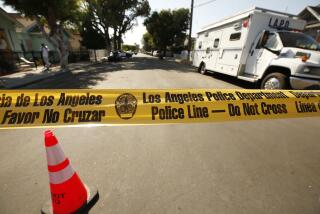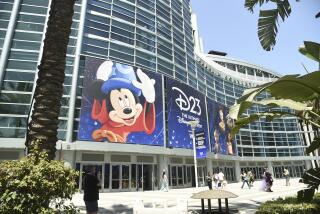Disneyland Nerve Gas Threat Called a Hoax : Probe: There’s no evidence that Japanese cult planned attack at park. But search is on for the person behind a videotaped warning.
- Share via
ANAHEIM — Federal law enforcement officials Saturday denied that a Japanese cult had planned to release nerve gas at Disneyland during the crowded Easter weekend and said that a threat received by park officials was a hoax.
Justice Department spokesman Carl Stern said in Washington that the FBI has launched a criminal investigation to determine who is responsible for the phony threat, which prompted worried officials to secretly dispatch a U.S. Army chemical warfare team and scientists to Disneyland.
Disneyland spokesman Tom Brocato said Saturday that the park’s security office received a threat on April 13 in a letter and videotape that showed a man wearing rubber gloves and mixing chemicals. Disneyland officials said they immediately notified U.S. authorities, but refused to publicly disclose further details of the incident.
Stern said the anonymous threat implied that a gas attack similar to the one in a Tokyo subway in March could be expected at the Orange County theme park. Tokyo police officials have charged members of a Japanese cult with releasing sarin, a highly toxic nerve agent, in the city’s subway, killing 12.
On Saturday, federal law enforcement officials in Southern California and Washington also rejected a published report that two Japanese tourists had been apprehended at Los Angeles International Airport “a few days before Easter” with instructions on how to make sarin.
“A report of the apprehension of two Japanese individuals . . . in connection with the (Disneyland) matter is not correct,” Stern said.
Paul West, the Baltimore Sun’s Washington bureau chief, said Saturday that the facts in the paper’s story are accurate.
The FBI subsequently concluded that the threat was a hoax, but officials initially thought it was serious enough and mobilized a chemical warfare team from the Army’s Aberdeen Proving Grounds in Maryland and scientists from the Centers for Disease Control in Atlanta. The specialists were flown cross-country to Disneyland to assess the danger.
“We have an obligation when such threats are received to put federal resources in place whether we believe the threat is real or not,” Stern said.
President Clinton and federal officials praised the Army and other U.S. agencies for their coordinated and speedy response to the perceived threat.
“In this instance, local and federal units, including the FBI, the Federal Emergency Management Agency, Department of Defense, Public Health Service and others put people and equipment into place with extraordinary speed and coordination,” Stern said. “It was a highly successful deployment of resources.”
President Clinton said at a press conference Friday that the multi-agency reaction was an example of the government’s ability to respond to a terrorist threat. This counterterrorist capability is something “the public does not see--most of which I should not comment on,” the President said.
White House officials confirmed Saturday that he was talking about the Disneyland incident.
Investigators said Saturday that the hoax might have been perpetrated by a current or former Disneyland employee. A federal official said investigators are working on this premise because the threat was made against the park’s “guests,” a term used by the park for its customers, and the letter and videotape were sent to the Disneyland security office.
“A criminal investigation is being conducted by the FBI in an effort to identify and prosecute whoever was responsible,” Stern said.
Heightened security at the Happiest Place on Earth was apparent over the Easter weekend. Brocato acknowledged that the park had extra guards on duty and more visitors’ bags were checked last weekend than normal, but he denied that the increased security had anything to do with the threat.
Marybeth Jones, a Beverly Hills resident who visited the park April 15, said that “pretty much everyone going through the gate was asked to open their bags.” Jones, a Florida native, said she has visited Disney World numerous times but guards there had never checked her bag.
“I was carrying a backpack and the guard asked me to show him the inside of the bag,” Jones said. “I didn’t think anything of it. I figured it was a normal thing to check for guns or drugs. The guard was very nice and not at all intrusive.”
Media reports that Disneyland might have been a terrorist target did not hurt attendance on Saturday, Brocato said. He said the park was “very busy” and attributed the large turnout to the comfortable spring weather.
Coming in the wake of the terrorist bombing in Oklahoma City, the hoax nevertheless raised concern among some Disneyland visitors, but not enough to make them cancel their trips to the park on Saturday.
Kevin Wood, who was visiting Disneyland with his wife and two children from Adelaide, Australia, said he had heard about the scare but went ahead with the family’s plans to visit the park. “You are angry and disappointed. In this world, you come to expect anything. Nothing is a surprise anymore,” he said.
Brocato declined to reveal many details about the park’s security operation, but insisted that customer safety is a major priority.
“We have this 40-year history here of having the best security there is,” Brocato said. “It’s of paramount importance to us.”
In February, Disneyland officials said there were 382 security personnel responsible for the park’s 250 acres--a huge number compared to the 352 sworn Anaheim police officers patrolling the 30,800 acres of the city outside.
The unarmed guards roam the various areas of Disneyland, dressed according to the themes of adjacent rides, Brocato said. Adventureland, with its new Indiana Jones ride, has guards in jungle garb; Tomorrowland, near Space Mountain, brings security forces wrapped in futuristic robes.
Beefing up the security operation is the Anaheim police force, which has no official substation on site but sends officers to the park daily, Brocato said.
Though Disney officials have long been loath to release crime statistics about the park, planning documents released in 1992 for the park’s expansion proposal offered a rare glimpse at the situation.
According to those documents, there were 5,292 security-related incidents at Disneyland in 1991, most of them involving theft, vandalism, assault, car theft, shoplifting and trespassing. Police officers were called to the scene 1,084 times.
Times staff writers Jeff Brazil, J.R. Moehringer, Jim Newton and Jodi Wilgoren contributed to this report. Brazil and Newton reported from Los Angeles.
More to Read
Sign up for Essential California
The most important California stories and recommendations in your inbox every morning.
You may occasionally receive promotional content from the Los Angeles Times.










